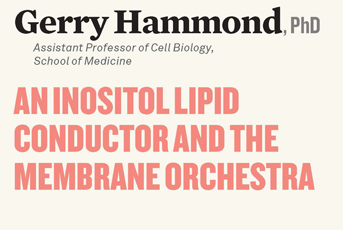
One of the keys to a healthy life is the harmonious activity of cell membranes—buzzing hubs for the transfer and assembly of cellular metabolites, signals, and structural components. Disruption of these membrane-associated functions often underpins disease, from aberrant membrane-derived signals that drive many cancers to redirected cellular metabolism during infectious disease. Hammond’s lab studies a crucial family of lipid molecules, the inositol lipids, that broadly direct membrane function. Failure to control the production of these lipids often leads to disease but in a manner that affects isolated functions, rather than the full gamut of associated membrane functions. Why this is remains a mystery, stemming from our limited understanding of basic mechanisms cells use to control the production of these cardinal lipids or how they are coupled to the different membrane activities they regulate. Hammond and colleagues use an array of state-of-the-art and high-resolution imaging and molecular-genetics approaches to interrogate these mechanisms in living cells in real time. Hammond aims to apply the new fundamental knowledge uncovered to understand the molecular basis of somatic and infectious disease.



























